- Home
- David Gemmell
Bloodstone Page 2
Bloodstone Read online
Page 2
Withdrawing, she lay back … and felt the approach of Jeremiah. Smiling, she sat up and turned toward the old man. “How is he?” she asked as Jeremiah eased himself down beside her.
“Getting stronger. I’d like you to sit with him.” The old man is troubled, but trying to hide it, she thought. Resisting the urge to flow into his mind, she waited for him to speak again. “He is a fighter, perhaps even a brigand. I just don’t know. It was our duty to help him, but the question is: Will he prove a danger to us as he grows stronger? Is he a killer? Is he wanted by the Crusaders? Could we find ourselves in trouble for harboring him? Will you help me?”
“Oh, Jeremiah,” said Isis softly. “Of course I will help you. Did you doubt it?”
He reddened. “I know you don’t like to use your talent on people. I’m sorry I had to ask.”
“You’re a sweet man,” she said, rising. Dizziness swept over her, and she stumbled. Jeremiah caught her, and she felt swamped by his concern. Slowly strength returned to her, but the pain had started in her chest and stomach. Jeremiah lifted her into his arms and walked back toward the wagons, where Dr. Meredith ran to them. Jeremiah sat her down in the wide rocking chair by the fire, while Meredith took her pulse. “I’m all right now,” she said. “Truly.”
Meredith’s slender hand rested on her brow, and it took all her concentration to blot out the intensity of his feelings for her. “I’m all right!”
“And the pain?” he asked.
“Fading,” she lied. “I just got up too quickly. It is nothing.”
“Get some salt,” Meredith told Jeremiah. When he returned, Meredith poured it into her outstretched palm. “Eat it,” he commanded.
“It makes me feel sick,” she protested, but he remained silent, and she licked the salt from her hand. Jeremiah passed her a mug of water, and she rinsed her mouth.
“You should rest now,” said Meredith.
“I will, soon,” she promised. Slowly she stood. Her legs took her weight, and she thanked both men. Anxious to be away from their caring glances, she moved to Jeremiah’s wagon and climbed inside, where the wounded man was still sleeping.
Isis pulled up a chair and sat down. Her illness was worsening, and she sensed the imminence of death.
Pushing such thoughts from her mind, she reached out, her small hand resting on the fingers of the sleeping man. Closing her eyes, she allowed herself to fall into his memories, floating down and down through the layers of manhood and adolescence, absorbing nothing until she reached childhood.
Two boys, brothers. One shy and sensitive, the other boisterous and rough. Caring parents, farmers. Then the brigands came. Bloodshed and murder, the boys escaping. Torment and tragedy affecting them both in different ways, the one becoming a brigand, the other …
Isis jerked back to reality, all thoughts of her illness forgotten as she stared down at the sleeping man. I am staring into the face of a legend, she thought. Once more she merged with the man.
The Jerusalem Man, haunted by the past, tormented by thoughts of the future, riding through the wild lands, seeking … a city? Yes, but much more. Seeking an answer, seeking a reason for being. And during his search stopping to fight brigands, tame towns, kill the ungodly. Riding endlessly through the lands, welcome only when his guns were needed, urged to move on when the killing was done.
Isis pulled back once more, dismayed and depressed—not just by the memories of constant death and battle but also by the anguish of the man himself. The shy, sensitive child had become the man of violence, feared and shunned, each killing adding another layer of ice upon his soul. Again she merged.
She/he was being attacked, men running from the shadows. Gunfire. A sound behind her/him. Cocking the pistol, Isis/Shannow spun and fired in one motion. A child flung back, his chest torn open. Oh, God! Oh, God! Oh, God!
Isis clawed her way free of the memory but did not fully withdraw. Instead she floated upward, allowing time to pass, halting only when the Jerusalem Man rode up to the farm of Donna Taybard. This was different. Here was love.
The wagons were moving, and Isis/Shannow rode out from them, scouting the land, heart full of joy and the promise of a better tomorrow. No more savagery and death. Dreams of farming and quiet companionship. Then came the Hellborn!
Isis withdrew and stood. “You poor, dear man,” she whispered, brushing her hand over the sleeping man’s brow. “I’ll come back tomorrow.”
Outside the wagon Dr. Meredith approached her. “What did you find out?” he asked.
“He is no danger to us,” she answered.
* * *
The young man was tall and slender, with a shock of unruly black hair cut short above the ears but growing long over the nape of his neck. He was riding an old, swaybacked mare up and over the Gap and stared with the pleasure of youth at the distant horizons, where the mountains reared up to challenge the sky.
Nestor Garrity was seventeen, and this was an adventure. The Lord alone knew how rare adventures were in Pilgrim’s Valley. His hand curled around the pistol butt at his hip, and he allowed the fantasies to sweep through his mind. He was no longer a clerk at the timber company. No, he was a Crusader hunting the legendary Laton Duke and his band of brigands. It did not matter that Duke was feared as the most deadly pistoleer this side of the Plague Lands, for the hunter was Nestor Garrity, lethal and fast, the bane of warmakers everywhere, adored by women, respected and admired by men.
Adored by women …
Nestor paused in his fantasy, wondering what it would be like to be adored by women. He had walked out once with Ezra Feard’s daughter, Mary, taken her to the summer dance. She had led him outside into the moonlight and flirted with him.
Should have kissed her, he thought. Should have done some damn thing! He blushed at the memory. The dance had turned into a nightmare when she had walked off with Samuel Klares. They had kissed. Nestor had seen them down by the creek. Now she was married to him and had just delivered her first child.
The old mare almost stumbled on the scree slope. Jerked from his thoughts, Nestor steered her down the incline.
The fantasies loomed back into his mind. He was no longer Nestor Garrity, the fearless Crusader, but Jon Shannow, the famed Jerusalem Man, seeking the fabled city and with no time for women, much as they adored him. Nestor narrowed his eyes and lifted his hat from where it hung at his back. Settling it into place, he turned up the collar of his coat and sat straighter in the saddle.
Jon Shannow would never slouch. He pictured two brigands riding from behind the boulders. In his mind’s eye he could see the fear on their faces. They went for their guns. Nestor’s hand snapped down. The pistol sight caught on the tip of his holster, twisting the weapon from his hands. It fell to the scree. Carefully Nestor dismounted and retrieved the weapon.
The mare, pleased to be relieved of the boy’s weight, walked on. “Hey, wait!” called Nestor, scrambling toward her. But she ambled on, and the dejected youngster followed her all the way to the bottom, where she stopped to crop the dry grass. Then Nestor remounted.
One day I’ll be a Crusader, he thought. I’ll serve the Deacon and the Lord. He rode on.
Where was the Preacher? It should not take this long to find him. The tracks were easy to follow to the Gap. But where was he going? Why did he ride out in the first place? Nestor liked the Preacher. He was a quiet man and throughout Nestor’s youth he had treated him with kindness and understanding. Especially when Nestor’s parents had been killed that summer ten years earlier, drowned in a flash flood. Nestor shivered at the memory. Seven years old—and an orphan. Frey McAdam had come to him then, the Preacher with her. He had sat at the bedside and taken Nestor’s hand.
“Why did they die?” the bewildered child had asked. “Why did they leave me?”
“I guess it was their time, only they didn’t know it.”
“I want to be dead, too,” the seven-year-old had wailed.
The Preacher had sat with him then, quietly talking
about the boy’s parents, of their goodness and their lives. Just for a while the anguish and the numbing sense of loneliness had left Nestor, and he had fallen asleep.
The previous night the Preacher had escaped from the church despite the flames and the bullets. And he had run away to hide. Nestor would find him, tell him that everything was all right now and it was safe to come home.
Then he saw the bodies, the flies buzzing around the terrible wounds. Nestor forced himself to dismount and approach them. Sweat broke out on his face, and the desert breeze felt cold on his skin. He could not look directly at them, so he studied the ground for tracks.
One horse had headed back toward Pilgrim’s Valley, then had turned and walked out into the wild lands. Nestor risked a swift, stomach-churning glance at the dead men. He knew none of them. More important, none of them was the Preacher.
Remounting, he set off after the lone horseman.
People were moving on the main street of Pilgrim’s Valley as Nestor Garrity rode in, leading the black stallion. It was almost noon, and the children were leaving the two school buildings and heading out into the fields to eat the lunches their mothers had packed for them. The stores and the town’s three restaurants were open, and the sun was shining down from a clear sky.
But a half mile to the north smoke still spiraled lazily into the blue. Nestor could see Beth McAdam standing amid the blackened timbers as the undertakers moved around the debris, gathering the charred bodies of the Wolvers. Nestor did not relish facing Beth with the news. She had been the headmistress of the lower school when Nestor was a boy, and no one had ever enjoyed the thought of being sent to her study. He grinned, remembering the day he had fought with Charlie Wills. They had been dragged apart and then taken to Mrs. McAdam; she had stood in front of her desk, tapping her fingers with the three-foot bamboo cane.
“How many should you receive, Nestor?” she had asked him.
“I didn’t start the fight,” the boy had replied.
“That is no answer to my question.”
Nestor had thought about it for a moment. “Four,” he had said.
“Why four?”
“Fighting in the yard is four strokes,” he had told her. “That’s the rule.”
“But did you not also take a swing at Mr. Carstairs when he dragged you off the hapless Charlie?”
“That was a mistake,” Nestor had said.
“Such mistakes are costly, boy. It shall be six for you and four for Charlie. Does that sound fair?”
“Nothing is fair when you’re thirteen,” Nestor had said, but he had accepted the six strokes, three on each hand, and had made no sound.
He rode slowly toward the charred remains of the little church, the stallion meekly following his bay mare. Beth McAdam was standing with her hands on her ample hips, staring out toward the wall. Her blond hair was braided at the back, but part of the braid had come loose and was fluttering in the wind at her cheek. She turned at the sound of the approaching horse and gazed up at Nestor, her face expressionless. He dismounted and removed his hat.
“I found the raiders,” he said. “They was all dead.”
“I expected that,” she said. “Where is the Preacher?”
“No sign of him. His horse headed east, and I caught up with it; there was blood on the saddle. I backtracked and found signs of wolves and bears, but I couldn’t find him.”
“He is not dead, Nestor,” she said. “I would know. I would feel it here,” she told him, hitting her chest with a clenched fist.
“How did he manage to kill five men? They were all armed. All killers. I mean, I never saw the Preacher ever carry a gun.”
“Five men, you say?” she replied, ignoring the question. “There were more than twenty surrounding the church, according to those who saw the massacre. But then, I expect there were some from our own … loving … community.”
Nestor had no wish to become involved in the dispute. Wolvers in a church was hardly decent, anyhow, and it was no surprise to the youngster that tempers had flared. Even so, if the Crusaders had not been called out to a brigand raid on Shem Jackson’s farm, there would have been no violence.
“Anything more you want me to do, Mrs. McAdam?”
She shook her head. “It was plain murder,” she said. “Nothing short.”
“You can’t murder Wolvers,” Nestor said, without thinking. “I mean, they ain’t human, are they? They’re animals.”
Anger shone in Beth’s eyes, but she merely sniffed and turned aside. “Thank you, Nestor, for your help. But I expect you have chores to do, and I’ll not keep you from them.”
Relieved, he turned away and remounted. “What do you want me to do with this stallion?” he called.
“Give it to the Crusaders. It wasn’t ours, and I don’t want it.”
Nestor rode away to the stone-built barracks at the south end of town, dismounting and hitching both horses to the rail outside. The door was open, and Captain Leon Evans was sitting at a roughly built desk.
“Good morning, sir,” said Nestor.
Evans looked up and grinned. He was a tall, broad-shouldered man with an easy smile. “Still looking to sign up, boy?”
“Yes, sir.”
“Been reading your Bible?”
“I have, sir. Every day.”
“I’ll put you in for the test on the first of next month. If you pass, I’ll make you a cadet.”
“I’ll pass, sir. I promise.”
“You’re a good lad, Nestor. I see you found the stallion. Any sign of the Preacher?”
“No, sir. But he killed five of the raiders.”
The smile faded from Captain Evans’s face. “Did he, by God?” He shook his head. “As they say, you can’t judge a man by the coat he wears. Did you recognize any of the dead men?”
“Not a one, sir. But three of them had their faces shot away. Looks like he just rode down the hill and blasted ’em to hell and gone. Five men!”
“Six,” said the captain. “I was checking the church this morning; there was a corpse there. It looks like when the fire was at its worst, the Preacher managed to smash his way out at the rear. There was a man waiting. The Preacher must have surprised him, there was a fight, and the Preacher managed to get the man’s gun. Then he killed him and took his horse. Jack Shale says he saw the Preacher riding from town, said his coat and hair were ablaze.”
Nestor shivered. “Who’d have thought it?” he said. “All his sermons were about God’s love and forgiveness. Then he guns down six raiders. Who’d have thought it?”
“I would, boy,” came a voice from the doorway, and Nestor turned to see the old prophet making his slow way inside. Leaning on two sticks, his long white beard hanging to his chest, Daniel Cade inched his way to a seat by the wall. He was breathing heavily as he sank to the chair.
Captain Evans stood and filled a mug with water, passing it to the prophet. Cade thanked the man.
Nestor faded back to the far wall, but his eyes remained fixed to the ancient legend sipping the water. Daniel Cade, the former brigand turned prophet, who had fought off the Hellborn in the Great War. Everyone knew that God spoke to the old man, and Nestor’s parents had been two of the many people saved when Cade’s brigands had taken on the might of the Hellborn army.
“Who burned the church?” asked Cade, the voice still strong and firm, oddly in contrast to the arthritic and frail body.
“They were raiders from outside Pilgrim’s Valley,” the captain told him.
“Not all of them,” said Cade. “There were townsfolk among the crowd. Shem Jackson was seen. Now, that disturbs me, for isn’t that why the Crusaders were not here to protect the church? Weren’t you called to Jackson’s farm?”
“Aye, we were,” said the captain. “Brigands stole some of his stock, and he rode in to alert us.”
“And then stayed on to watch the murders. Curious.”
“I do not condone the burning of the church, sir,” said the captain. “But it must b
e remembered that the Preacher was told—repeatedly—that Wolvers were not welcome in Pilgrim’s Valley. They are not creatures of God, not made in his image, nor true creations. They are things of the Devil. They have no place in a church or in any habitat of decent folk. The Preacher ignored all warnings. It was inevitable that some … tragedy … would befall. I can only hope that the Preacher is still alive. It would be sad … if a good man—though misguided—were to die.”
“Oh, I reckon he’s alive,” said Cade. “So you’ll be taking no action against the townspeople who helped the raiders?”
“I don’t believe anyone helped them. They merely observed them.”
Cade nodded. “Does it not strike you as strange that men from outside Pilgrim’s Valley should choose to ride in to lance our boil?”
“The work of God is often mysterious,” said Evans, “as you yourself well know, sir. But tell me, why were you not surprised that the Preacher should tackle—and destroy—six armed men? He shares your name, and it is said he is your nephew or was once one of your men in the Hellborn War. If the latter is true, he must have been very young indeed.”
Cade did not smile, but Nestor saw the humor in his eyes. “He is older than he looks, Captain, and no, he was never one of my men. Nor is he my nephew—despite his name.” With a grunt the prophet pushed himself to his feet. Captain Evans took his arm, and Nestor ran forward to gather his sticks.
“I’m all right. Don’t fuss about me!”
Slowly and with great dignity the old man left the room and climbed to the driving seat of a small wagon. Evans and Nestor watched as Cade flicked the reins.
“A great man,” said Evans. “A legend. He knew the Jerusalem Man. Rode with him, some say.”
“I heard he was the Jerusalem Man,” said Nestor.
Evans shook his head. “I heard that, too. But it is not true. My father knew a man who fought alongside Cade. He was a brigand, a killer. But God shone the great light upon him.”

 Bloodstone
Bloodstone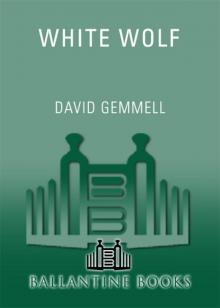 White Wolf
White Wolf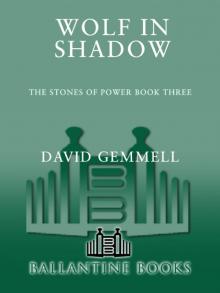 Wolf in Shadow
Wolf in Shadow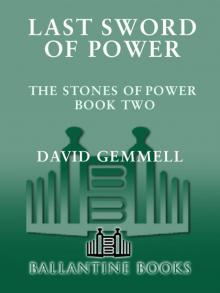 Last Sword of Power
Last Sword of Power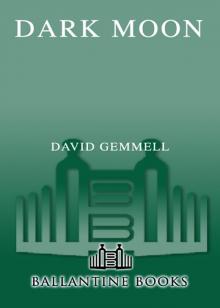 Dark Moon
Dark Moon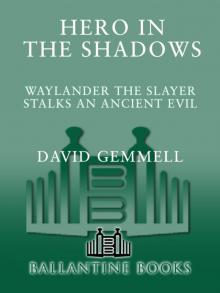 Hero in the Shadows
Hero in the Shadows Gemmell, David - Drenai 09 - Hero In The Shadows
Gemmell, David - Drenai 09 - Hero In The Shadows Waylander
Waylander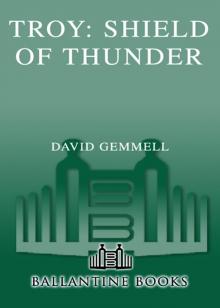 Shield of Thunder
Shield of Thunder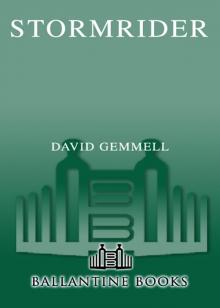 Stormrider Stormrider
Stormrider Stormrider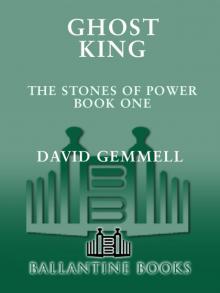 Ghost King
Ghost King Legend
Legend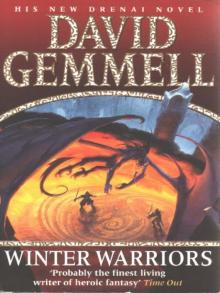 Winter Warriors
Winter Warriors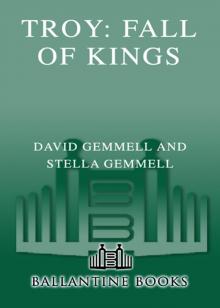 Fall of Kings
Fall of Kings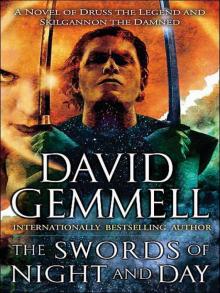 The Swords of Night and Day
The Swords of Night and Day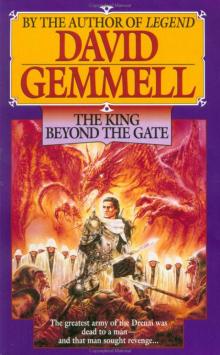 The King Beyond the Gate
The King Beyond the Gate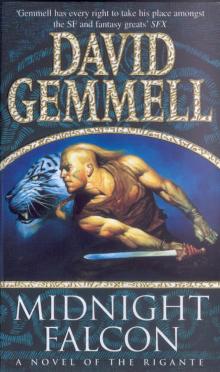 Midnight Falcon
Midnight Falcon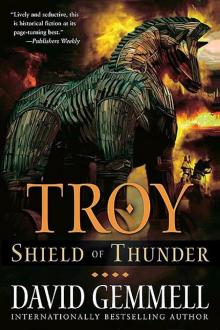 02 - Shield of Thunder
02 - Shield of Thunder In the Realm of the Wolf
In the Realm of the Wolf Ravenheart
Ravenheart The First Chronicles of Druss the Legend
The First Chronicles of Druss the Legend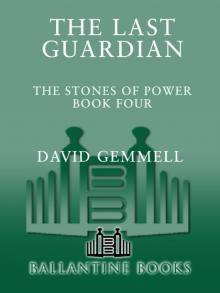 Last Guardian
Last Guardian Stormrider
Stormrider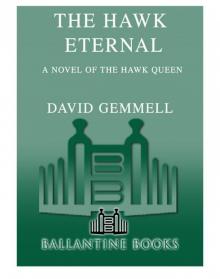 The Hawk Eternal
The Hawk Eternal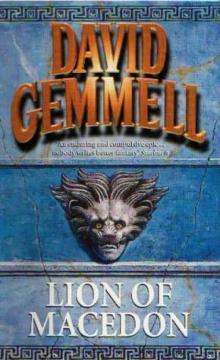 Lion of Macedon
Lion of Macedon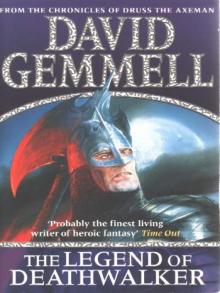 The Legend of Deathwalker
The Legend of Deathwalker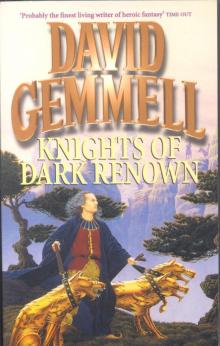 Knights of Dark Renown
Knights of Dark Renown Echoes of the Great Song
Echoes of the Great Song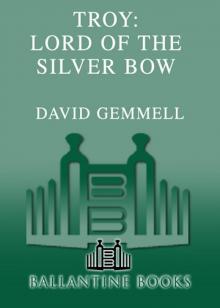 Lord of the Silver Bow
Lord of the Silver Bow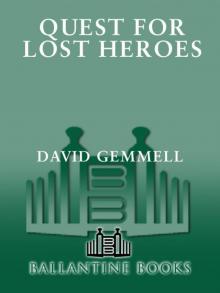 Quest for Lost Heroes
Quest for Lost Heroes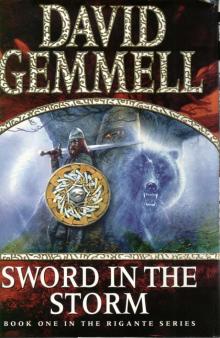 Sword in the Storm
Sword in the Storm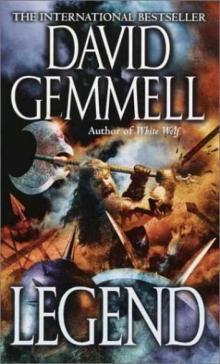 Drenai Saga 01 - Legend
Drenai Saga 01 - Legend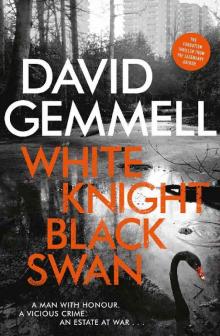 White Knight/Black Swan
White Knight/Black Swan![[Troy 02] - Shield of Thunder Read online](http://i1.bookreadfree.com/i/03/19/troy_02_-_shield_of_thunder_preview.jpg) [Troy 02] - Shield of Thunder
[Troy 02] - Shield of Thunder Lord of the Silver Bow t-1
Lord of the Silver Bow t-1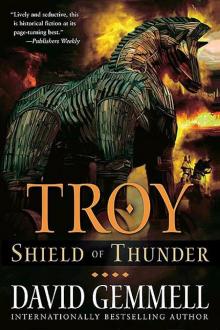 Shield of Thunder t-2
Shield of Thunder t-2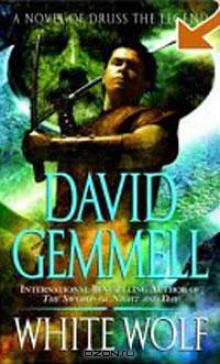 White Wolf: A Novel of Druss the Legend dt-10
White Wolf: A Novel of Druss the Legend dt-10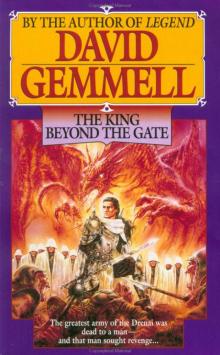 Drenai Saga 02 - The King Beyond the Gate
Drenai Saga 02 - The King Beyond the Gate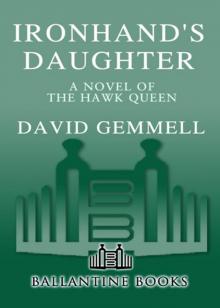 Ironhand's Daughter
Ironhand's Daughter Gemmell, David - Drenai 06 - The First Chronicles of Druss the Legend
Gemmell, David - Drenai 06 - The First Chronicles of Druss the Legend The Last Guardian
The Last Guardian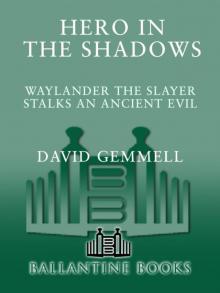 Hero in the Shadows: A Waylander the Slayer Novel
Hero in the Shadows: A Waylander the Slayer Novel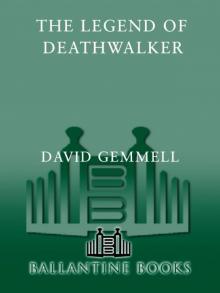 The Legend of the Deathwalker
The Legend of the Deathwalker